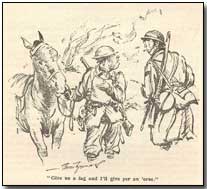Memoirs & Diaries - The Best 500 Cockney War Stories - Gunga Din the Second and Other Stories
 Published in London
in 1921, The Best 500 Cockney War Stories
comprised, in the words of its newspaper publisher (The London Evening
News) "a remembering and retelling of those war days when laughter
sometimes saved men's reason".
Published in London
in 1921, The Best 500 Cockney War Stories
comprised, in the words of its newspaper publisher (The London Evening
News) "a remembering and retelling of those war days when laughter
sometimes saved men's reason".
The collection of short memoirs, some 500 in total, is divided into five categories - Action, Lull, Hospital, High Seas and Here and There. This page contains five stories from Lull, led by Gunga Din the Second.
Other sections within the collection can be accessed using the sidebar to the right.
Gunga Din the Second
After the battle of Shaikh Sa'Ad in Mesopotamia in January 1916 more than 300 wounded were being transported down the Tigris to Basra in a steamer and on open barges lashed on either side of it.
Many suffered from dysentery as well as wounds - and it was raining.
There appeared to be only one Indian bhisti (water-carrier), an old man over 60 years of age, to attend to all.
He was nearly demented in trying to serve everyone at once. When my severely wounded neighbour - from Camberwell, he said - saw the bhisti, his welcome made us smile through our miseries.
"Coo! If it ain't old Gunga Din! Wherever 'ave yer bin, me old brown son? Does yer muvver know yer aht?"
A. S. Edwardes (late C.S.M., 1st Seaforth Highlanders), West Gate, Royal Hospital, Chelsea, S.W.3
A Fag fer an 'Orse
Late one afternoon towards the end of 1917, on the Cambrai sector, enemy counter-attacks had caused confusion behind our lines, and as I was walking along a road I met a disconsolate-looking little Cockney infantryman leading a large-size horse.
He stopped me and said, "Give us a fag, mate, and I'll give yer an 'orse."
I gathered that he had found the horse going spare and was taking it along with him for company's sake.
H. J. Batt (late Royal Fusiliers), 21 Whitehall Park Road, W.4
Put to Graze
It was at the siege of Kut, when the 13th ("Iron") Division was trying to relieve that gallant but hard-pressed body of men under General Townshend.
Rations had been very low for days, and the battery had been digging gun-pits in several positions, till at last we had a change of position and "dug in" to stay a bit.
What with bad water, digging in, and hardly any food, the men were getting fed up generally.
An order came out to the effect that "A certain bunchy grass (detailed explanation) if picked and boiled would make a very nourishing meal."
One hefty Cockney, "Dusty" Miller, caused a laugh when he vented his feelings with "'Struth, and nah we got ter be blinking sheep. Baa-Baa!"
E. J. Bates (late R.F.A.), 37 Ulverscroft Road, E. Dulwich
Smith's Feather Pillow
The boys had "rescued" a few hens from a deserted farm. The morning was windy and feathers were scattered in the mud.
Picquet officer (appearing from a corner of the trench): "What's the meaning of all these feathers, Brown?"
Brown: "Why, sir, Smiff wrote 'ome sayin' 'e missed 'is 'ome comforts, an' 'is ma sent 'im a fevver piller; an' 'e's so mad at our kiddin' that 'e's in that dug-out tearin' it to bits."
John W. Martin, 16 Eccles Road, Lavender Hill, S. W.11
Bombs and Arithmetic
We were in the trenches in front of Armentieres in the late summer of 1916. It was a fine, quiet day, with "nothing doing."
I was convinced that a working party was busy in a section of the German trenches right opposite.
Just then "O. C. Stokes" came along with his crew and their little trench gun. I told him of my "target," and suggested that he should try a shot with his Stokes mortar.
Glad of something definite to do, he willingly complied.
The Stokes gun was set down on the floor of the trench just behind my back, as I stood on the firestep to observe the shoot.
I gave the range. The gun was loaded. There was a faint pop, a slight hiss - then silence.
Was the bomb going to burst in the gun and blow us all to bits? I glanced round apprehensively.
A perfectly calm Cockney voice from one of the crew reassured me:
"It's orl right, sir! If it don't go off while yer counts five you'll know it's a dud!"
Capt. T. W. C. Curd (late 20th Northumberland Fusiliers), 72 Victoria Street, S.W.1
Next - Help from Hindenburg and four other stories
"Drum Fire" was an artillery barrage fired not in salvo but by each gun in succession.
- Did you know?

